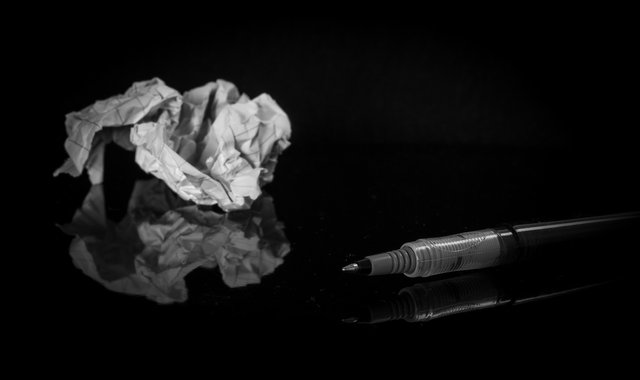Writers, should you compose on paper or screen? 3 ways to tell
Remember journals? Remember filling notebooks with drafts of poems and stories? Remember typing them all up when you were sure they were “finished”?
Or do you still keep those journal and notebooks?
For many writers, paper and pen were our original method of composition. Technology has given us word processing software and even writing apps that have replaced pens with key strokes—for some of us.
If you’re trying to organize your creative process and establish a regular writing practice, having a plan for how to compose, based on what works best for you, is a great start. There is no right or wrong method of composition, but if you can’t decide which one to use, here are three things to consider:
Which is faster for you?
Some of us can type faster than we can think, and probably choose to compose on screen. Some of us hunt and peck on the keyboard but feel perfectly comfortable with a pen in hand. Whichever method you choose should answer this basic question: what will get me to the actual writing faster? If you have to boot up an ancient computer before you can start writing, reach for a notebook. If you can’t find a pen but the computer is on, type first and buy new pens later!
Of course, length is a consideration: if your writing project is longer, like a novel or long-form essay, typing is going to be easier on your hands. Poems and short stories can be more easily written out on paper and typed up later.
And let’s consider distraction as a deterrent to speed, too. If you can’t fire up your computer to write without checking social media first, then longhand composition is definitely going to be faster for you. If, like me, a handwritten page full of scratched-out words makes your brain hurt, then a clean screen will keep you plowing ahead.
Which is more intuitive for you?
Again I say, some of us can type faster than we can think, which can lead to free or automatic writing if you can tap into that creative flow and not think so much about where it’s going, or how tired your writing hand is getting. Even if you write for 20 minutes and don’t hit a stride until 15 minutes in, it’s quick and easy to scroll up and delete the drivel. Automatic writing is an excellent tool for overcoming blocks, and many of us prefer a keyboard for such exercises.
There is also the visceral sensation to consider—because we’re making art, after all, so the process itself should be comfortable and stimulating. Do you like the sound of keys better than the feel of a pen? Does one process or the other make you feel more awake, engaged, and inspired? In a 2014 article, The Guardian quoted Edouard Gentaz, a professor of psychology at the University of Geneva, with the assertion that, “Handwriting is a complex task which requires various skills—feeling the pen and paper, moving the writing implement, and directing movement by thought.” In other words, cognitively speaking, there’s a lot more going on when we write than when we type.
Furthermore, the article points out that word processing, while faster, is somewhat limiting in terms of format; “…you cannot invent a form not foreseen by the software.” Does that limit your creativity? Or maybe you get the words down first and conceive of a form and structure later, during revision…
Which is easier for you to begin to approach revising?
If you are a writer who keeps every draft of your work, it might be easier for you to compose on paper and simply flip to a clean sheet. Digital drafts must be renamed every time you want to save one, and even then, it can be harder to track them. If you are organizing a lot of completed drafts into a manuscript, hard copies are often the way to go. Whether handwritten or typed, you can three-hole punch your copies and move them around at will within a binder. In Microsoft Word, you could use the Track Changes feature to view (and save) all changes you make to a given document; but once you click “Accept all changes,” the history of your revisions will be erased and you’ll be left with the latest version.
Finally, is sharing your work with others part of your revision process? If so, digital drafts are much faster and easier to share; simply copy and paste into a chat box, upload to Google Drive, or attach to an email and send it off. Of course, if you have access to a scanner, you can also scan hard copies and email them—as long as whoever you’re sending them to can read your handwriting!
Do you compose on paper or the screen, and why?
This post first appeared at the blog for the Center for Creating Writing. I am the Center's director, and this is my original content. Learn more and receive tips and tricks like these in your email inbox every Sunday morning by signing up for our email list.


This has always been a thought for me, like, I typically like to write it with pencil first, just because I recognize my handwriting and literally 'write how I think,' but the issue with this is that I then have to type it out for, ya know, submission.
I did the National Novel Writing Month a few years ago, and to save time, I just typed it out, and the prose is not too different than my handwritten stuff, but there's definitely a quality variation.
I find myself using pen and paper mostly when it's inconvenient to type, like if I'm out somewhere without my laptop and have to get something down. And yes, most publications don't want handwritten copies! Thanks for reading.
@shapeshifter43 in my own perspective writing on a sheet of paper is good for short note or keep valuable record. But writing on a screen will is much more good for transferrable project, it will be quiet hard to write on a paper and later start retyping on the screen. Beside technology has made it really possible to print type document, i don't think it is advisable to write on a paper in this century.
I tend to agree. I'm a typer. But I still love how pen and paper feel, you know? Thanks for reading and commenting!
I started off with paper and pencil/pen (and napkins, and the backs of envelopes). I moved to typing everything in the last few years, but always had a journal or notebook of some sort in my bag or purse "just in case". In the last year, I try to force myself to write poems out longhand before typing them (and editing), but fiction has almost always been a "type everything" situation for me.
I still carry a small journal/notebook everywhere. I need somewhere to write down snippets until I can come back to them later.
Makes sense. Pocket and purse sized journals are amazing things. A friend of mine has been hand painting journals. https://www.facebook.com/pg/aaminahshakur.poetartist/photos/?tab=album&album_id=1551198608297763
Those are gorgeous! I love the moon cycle one. <3
Oddly, I hadn't considered whether one felt more natural/intuitive. I really enjoy this post.
Thank you! <3